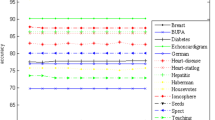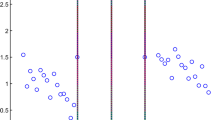Abstract
One-class support vector machine (OCSVM) tries to find a hyperplane to distinguish normal data from all other possible outliers or abnormal data. However, only support vectors determine the hyperplane. In this paper, we propose a novel data description method called locality preserving one-class support vector machine (LPOCSVM). It takes the intrinsic manifold structure of data into full consideration. In the paper, we discuss the linear and nonlinear case of LPOCSVM, and detail how to tackle the singularity of the locality preserving scatter matrix. Experimental results on several toy and benchmark datasets indicate the effectiveness and advantage of LPOCSVM by comparing it with OCSVM.
Access this chapter
Tax calculation will be finalised at checkout
Purchases are for personal use only
Similar content being viewed by others
References
Scholkopf, B., Smola, A.: Learning With Kernels. MIT Press, Cambridge, MA (2002)
Vapnik, V.: The Nature of Statistical Learning Theory. Springer, New York (1995)
Scholkopf, B., Platt, J., Shawe-Taylor, J., Smola, A., Williamson, R.: Estimating the support of a high dimensional distribution. Neural Comput. 13, 1443–1471 (2001)
Tax, D.M.J., Duin, R.P.W.: Support vector data description. Mach. Learn. 54, 45–66 (2004)
Tran, Q., Li, X., Duan, H.: Efficient performance estimate for one-class support vector machine. Pattern Recogn. Lett. 26, 1174–1182 (2005)
Choi, Y.S.: Least squares one-class support vector machine. Pattern Recogn. Lett. 30, 1236–1240 (2009)
Bilgin, G., Erturk, S., Yildirim, T.: Segmentation of hyperspectral images via subtractive clustering and cluster validation using one-class support vector machines. IEEE Trans. Geosci. Remote Sens. 49, 2936–2944 (2011)
Gomez-Verdejo, V., Arenas-Garcia, J., Lazaro-Gredilla, M., Navia-Vazquez, A.: Adaptive one-class support vector machine. IEEE Trans. Signal Process. 59, 2975–2981 (2011)
Li, Y.H.: Selecting training points for one-class support vector machines. Pattern Recogn. Lett. 32, 1517–1522 (2011)
Yin, S., Zhu, X., Jing, C.: Fault detection based on a robust one-class support vector machines. Neurocomputing 145, 263–268 (2014)
He, X., Niyogi, P.: Locality preserving projections. In: Proceedings of the Conference on Advances in Neural Information Processing Systems, pp. 585–591 (2003)
Fletcher, R.: Practical Methods of Optimization, 2nd edn. Wiley, New York (1987)
Yang, J., Yang, J.Y.: Why can LDA be performed in PCA transformed space? Pattern Recogn. 36, 563–566 (2003)
Blake, C., Merz, C.: UCI Repository of machine learning databases. http://www.ics.uci.edu/_mlearn/MLRepository.html.
Manor, L.Z., Perona, P.: Self-tuning spectral clustering. In: Advances in Neural Information Processing Systems, pp:1601–1608 (2005)
Kwok, J.T., Tsang, I.W., Zurada, J.M.: A class of single-class minimax probability machines for novelty detection. IEEE Trans. Neural Netw. 18, 778–785 (2007)
Zhang, L., Zhou, W.D.: 1-norm support vector novelty detection and its sparseness. Neural Netw. 48, 125–132 (2013)
Hodge, V.J., Austin, J.: A survey of outlier detection methodologies. Artif. Intell. Rev. 22, 85–126 (2004)
Acknowledgements
This work is supported in part by the Key Scientific Research Foundation of Sichuan Provincial Department of Education (Grant No.11ZA004), the National Science Foundation of China (Grant No. 61103168, 61271413, 61472329).
Author information
Authors and Affiliations
Corresponding author
Editor information
Editors and Affiliations
Rights and permissions
Copyright information
© 2015 Springer International Publishing Switzerland
About this paper
Cite this paper
Wang, X., Tian, Y., Yang, X., Du, Y. (2015). Locality Preserving One-Class Support Vector Machine. In: He, X., et al. Intelligence Science and Big Data Engineering. Big Data and Machine Learning Techniques. IScIDE 2015. Lecture Notes in Computer Science(), vol 9243. Springer, Cham. https://doi.org/10.1007/978-3-319-23862-3_8
Download citation
DOI: https://doi.org/10.1007/978-3-319-23862-3_8
Published:
Publisher Name: Springer, Cham
Print ISBN: 978-3-319-23861-6
Online ISBN: 978-3-319-23862-3
eBook Packages: Computer ScienceComputer Science (R0)




